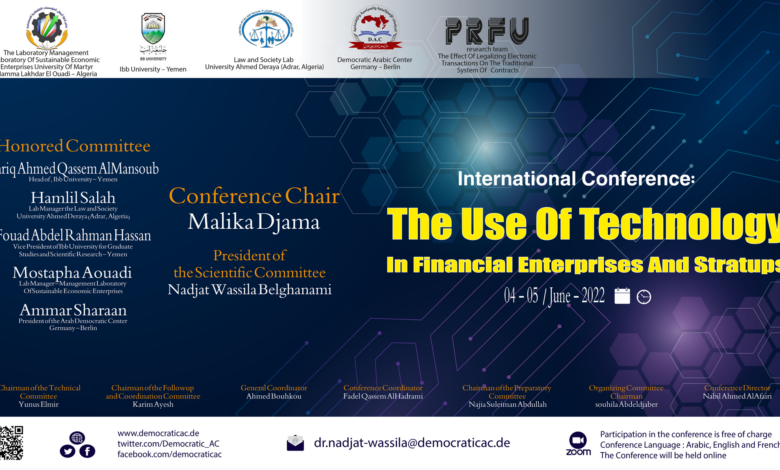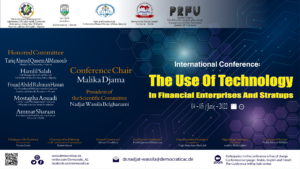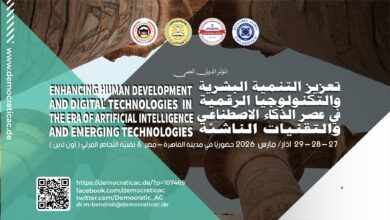The Use Of Technology In Financial Enterprises And Stratups

The #Democratic_Arabic_Center based in Germany – Berlin, is pleased to announce the International Online Conference on
The Use Of Technology In Financial Enterprises And Stratups
04-05/06/2022
In collaboration with
- Ibb University – Yemen
- The Laboratory Management Laboratory Of Sustainable Economic Enterprises University Of Martyr Hamma Lakhdar El Ouadi – Algeria
- In participation with the search band PRFU – The Effect Of Legalizing Electronic Transactions On The Traditional System Of Contracts / project code: G01L01CU370120200001
The conference will be held using the technology of video lectures via the Zoom application
Conference Chair :Dr. Malika Djama
President of the Scientific Committee : Nadjat Wassila Belghanami
Honored Committee
- Dr. Tariq Ahmed Qassem Al-Mansoub – Head of , Ibb University – Yemen
- Mostapha Aouadi Lab Manager – Management Laboratory Of Sustainable Economic Enterprises
- Fouad Abdel Rahman Hassan – Vice President of Ibb University for Graduate Studies and Scientific Research – Yemen
- Ammar Sharaan – President of the Arab Democratic Center – Germany – Berlin
Conference management
- Organizing Committee Chairman: souhila Abdeldjaber
- Conference Director: Dr. Nabil Ahmed Al-Afairi – Ibb University – Yemen
- Chairman of the Preparatory Committee: Najia Suleiman Abdullah – Editor-in-chief of the Journal of Political Science and Law
- Conference Coordinator: Fadel Qassem Al-Hadrami – Ibb University – Yemen
- General Coordinator: Ahmed Bohko – Editor-in-chief of the International Journal of Economic Studies
- Chairman of the Follow-up and Coordination Committee: Karim Ayesh – Administrative Director – Arab Democratic Center
- Chairman of the Technical Committee: Yunus Elmir
The Scope of the Conference
The financial sector has witnessed many changes in its services, financial and banking products, and forms of its financial institutions that transcend commercial banks and financing institutions for small projects and credit cooperative institutions, which resulted in the emergence of financial accounts, credit cards, financial transfers using smart phones and digital credit,…etc. This required setting a deep base in the infrastructure of the financial markets and regulatory bodies, which necessarily necessitated its embodiment in formal frameworks in a clear regulatory and legal form so that its users are not exposed to harm, whether from financial service providers, or from account hackers, away from informational gaps and risks that appear as a result of financial fraud practices, electronic attacks and various problems Cybersecurity
Hence, financial technology has emerged as a new field in financial management that is used to improve financial operations through applications, processes, products and business models created in the field of financial services, which has contributed in emergence of financial technology companies represented by emerging projects, financial institutions and well-established technical companies aiming to promote financial technology technologies from In order to improve and develop its services, to reduce the gap in the digital illiteracy index that is resistant to change. We often find digital cards stacked in financial institutions, and if they exist, they are not used by their owners
In order to strengthen the digital culture that supports change and the technological readiness that enhances confidence, recent technical developments have imposed guarantees on the practices of financial technology and users, in order to move from an information society to an intelligent and virtual society, to mention but not limited to
- Providing a way for consumers to secure immediate short-term loans for purchases; 24 hours a day, by conducting data via smart phones, giving consumers better options than local banks and financial institutions
- Banking institutions have provided financial products for electronic payment in every commercial activity, whether it is in stores in reality, or electronic stores via the Internet, to obtain funds for these business via the Internet through various means such as electronic wallets, electronic bank accounts, and others
The problematic
According to the foregoing, we will try, through this scientific symposium, to research the following problem
- To what extent did financial technology contribute to alleviating the traditional obstacles in the banking sector and financial practices, and how did this contribute to the recovery and development of the activities of emerging institutions
- What are the legal guarantees that contributed to securing its financial operations
Objectives
Through this seminar, we aspire to achieve the following goals
- Recognize the reality of the applications, processes, products and business models developed in the field of financial services
- Enhancing emerging institutions (startups) in electronic trading in the field of financial technology towards cloud computing technologies
- Introducing investment strategies in the currency and stock exchange market related to electronic trading platforms to enhance cyber security
- Ensuring the flow of Islamic transactions and financial technology in Islamic institutions and banks
- Identify legal guarantees to protect electronic payment
- Benefit from leading financial technology models
Axes
Digital currencies and smart contracts
- Cyber security for banking and financial services
- Electronic payment networks and institutions
- Global FinTech Market
- Emerging companies in the field of financial technology
- Supporting bodies for financial trading in emerging institutions
- Models of promoting financial technology applications in the Islamic world and the Arab world
Scientific Committee
- Adala Laadjal – University Abdelhamid Ibn Badis Of Mostagane Algeria
- Pr Benamran Insaf -University Abbès Laghrour Khenchela Algeria
- Malik Mebarki –University Lille France
- Pr . Hammoudi Mohammed -University Center Of Alih Kafi Tindouf Algeria
- Pr Mohamed Buheji -University Of Bahrain
- Pr Boussahmine Ahmed -University Tahri Mohammed Béchar Algeria
- Pr Benabed Mokhtar -University Center Of Alih Kafi Tindouf Algeria
- Pr Sayeh Hamza University Center Of bayedh Algeria
- Mourad Benharzallah -University Center Of Alih Kafi Tindouf Algeria
- Pr Tafer Zohier -University Abou Bekr Belkaid Tlemcen Algeria
- Pr Naser Rahal-University Center Of Alih Kafi Tindouf Algeria
- Nassri Naffissa -University Tahri Mohammed Béchar Algeria
- Pr Bensouffiane Zohra-University Tahri Mohammed Béchar Algeria
- Pr Bendinne Mahamed -University Ahmed Draya Adrar Algeria
- Ayach Zoubir, University of Oum El Bouaghi – Algeria
- Bilal Chikhi University of Boumerdes – Algeria
- Fouad Ahmed Al-Afairi Ibb University – Yemen
- Muhammad Hamoud Al-Samahi, Ibb University, Yemen
- Ayed Abdel Aziz Ali, Ibb University – Yemen
- Anwar Abdul-Aziz Al-Wahsh, Ibb University, Yemen
- Adel Ali Al-Warafi, Ibb University, Yemen
- Pr Hassan Abdul Malik, Ibb University, Yemen
- Pr Wahib Abdulaziz Al-Hubaishi, Ibb University, Yemen
- Murad Muhammad Qamhan, Ibb University, Yemen
- Adel Ahmed Al-Afiri, Ibb University, Yemen
- Kaddouri Tariq, University of Lakhdar, Hammat El Wadi – Algeria
- Ali Atiq University of Ouargla – Algeria
- Awadi Abdelkader, University of Biskra, Algeria
- Abbassi Saber University of Biskra, Algeria
- Amamra Mohamed El Eid, University of Lakhdar, Hammat El Wadi – Algeria
- Ghadebna Lilia University of Oum El Bouaghi – Algeria
- Dr Mazzouz Rabia -University Center Of Alih Kafi Tindouf Algeria
- Dr Bourbaba Soriya- University Tahri Mohammed Béchar Algeria
- Dr Bakraoui Mohamed Elmahdi-University Ahmed Draya Adrar Algeria
- Dr .Nasreddine Ahmed Joma -Repository For The National Research Center Sudan
- Naser Abdel Raheem Al Ali -Law Institute Of Russian University Of Transport
- Dr Edward Nashet Nashed-El Obour Higher Institute For Management, Computers And Information Systems, Egypt
- Dr Hazem Farwana -University Abou Bekr Belkaid Tlemcen Algeria
- Dr Dina Taman- Cairo University
- Arbia Hlali, University Of Sfax
- Abbess Hassen Reda -Lebanese University Lebanon
- Dr Mittaq Bayath – Krit University, Iraq
- Dr Souhila Abdeladjabar -University Tahri Mohammed Béchar Algeria
- Dr Musstapha Bayadh -University Center Of Alih Kafi Tindouf Algeria
- Dr Salhi Abdelnasser -University Center Of Alih Kafi Tindouf Algeria
- Dr Ahmed Den-University Center Of Alih Kafi Tindouf Algeria
- Dr Yahyaoui Hasnia-University Center Of Alih Kafi Tindouf Algeria
- Dr Fardi Hammad -University Center Of Alih Kafi Tindouf Algeria
- Dr Muissi Nourdine -University Center Of Alih Kafi Tindouf Algeria
- Dr Laib Mohamed Rafik-University Souk Ahrass Algeria
- Dr Djama Malika-University Center Of Alih Kafi Tindouf Algeria
- Dr Mahfoudh Arabi-Université Of Tizi Ouzou Algeria
- Hana Mahmoud Sayed Ahmed -Cairo Higher Institute For Engineering, Computer Science And Management
- Dr Arkoub Ouali -University Of Boumerdes Algeria
- Dr Bourahla Miloud-University Center Of Alih Kafi Tindouf Algeria
- Dr Benzair Abdelouahab-University Center Of Alih Kafi Tindouf Algeria
- Dr .Oudali Mohammed-University Center Of Alih Kafi Tindouf Algeria
- Nadjat Wassila Belghanami- University Tahri Mohammed Béchar Algeria
- Dr . Belhadj Belkhier-University Center Of Alih Kafi Tindouf Algeria
- Dr Benyamine Khaled – University Tahri Mohammed Béchar Algeria
- Dr Melouki Abdallah-University Mohamed Lamine Debaghine Setif Algeria
- Dr Belghanami Nabila-University Tahri Mohammed Béchar Algeria
- Dr Laidi Abdelkader-University Center Of Alih Kafi Tindouf Algeria
- Dr Saadi Haroun-University Center Of Alih Kafi Tindouf Algeria
- Benabdelaziz Soufiane-University Tahri Mohammed Béchar Algeria
- Dr Mazouni Mohamed-University 1 El Hadj Lakhdar Batna Algeria
- Dr Fawzi Mahmoud Ellafi Elhasoumi -Higher Institute Of Science And Technology, Libya
- Anna Alexandrovna Chebotareva-Administrative Law, Environmental
- Russian
- Allali Mokhtar-University Tahri Mohammed Béchar Algeria
- Vladimir E. Chebotarev-Law Institute Of Russian University Of Transport
- Zerrouki Abasiya-University Of Ghardaya Algeria
- Hassani Bouhsoune-University Of Chelef Algeria
- Yasser Ahmed Mahmoud Al-Ajlouni,Irbid National UniversityJordan
- Dr Ayat Asma-University Center Of Alih Kafi Tindouf Algeria
- Benali Amina-University Tahri Mohammed Béchar Algeria
- Karem Salem Abdaraouf Salem-Ain Shams University – Egypt
- Miloud Azzouz, University of Biskra – Algeria
- Tokrat Yazid University of Oum El Bouaghi – Algeria
- Tommy Ibrahim University of Biskra – Algeria
- Sawsan Zreik, University of Skikda-Algeria
- Walid Marghani, University of the Valley – Algeria
- Al-Absi Ali University of the Valley – Algeria
- Ben Faraj Zouina, University of Bordj Bou Arreridj – Algeria
- Baaddi Asia University of the Valley – Algeria
- Malika Djama University Center Of Alih Kafi Tindouf Algeria
- Assi-Pr Yahi Toufik-University Center Of Alih Kafi Tindouf Algeria
- Assi-Pr Abdesselam Kichich- University Center Of Alih Kafi Tindouf Algeria
- Assi-Pr Omar Hamadiana-University Center Of Alih Kafi Tindouf Algeria
Organizing Committee
- Abdul Malik Muhammad Al-Saqqaf, Ibb University, Yemen
- Lutf Al-Juhaifi, Ibb University, Yemen
- Ali Abdul Karim Barakat, Ibb University, Yemen
- Abdullah Muhammad Ibb University – Yemen
- Murad Yahya Al-Jahafi, Ibb University, Yemen
- Dr .bari amina University Center Of Alih Kafi Tindouf Algeria-Dr Bari Amina
- Assi-Pr Issa Dibwan Al-Shamiri, Ibb University, Yemen
- Assi-Pr Afaf Abdel Salam Al-Wahhabi Ibb University – Yemen
- Assi-Pr Afrah Saleh Al-Fahad, Ibb University, Yemen
- Assi-Pr Nawal Murshid Taher Al-Absi, Ibb University – Yemen
- Assi-Pr Ali Abdo Al-Banna, Ibb University, Yemen
- zeghamine mahmoude University Center Of Alih Kafi Tindouf Algeria
- Benssad Djamel-University Center Of Alih Kafi Tindouf Algeria
- Challa Brahim-University Center Of Alih Kafi Tindouf Algeria
- Zerrouki Billal-University Center Of Alih Kafi Tindouf Algeria
- Miss .Aissaoui Fatma-University Center Of Alih Kafi Tindouf Algeria
- Miss .Maameri Iman-University Center Of Alih Kafi Tindouf Algeria
- Miss Lairibi Fatima Zohra-University Center Of Alih Kafi Tindouf Algeria
- Maameri Zakaria-University Center Of Alih Kafi Tindouf Algeria
- Targui Mohammed Saleh-University Center Of Alih Kafi Tindouf Algeria
- Merabti Zohra-University Center Of Alih Kafi Tindouf Algeria
- Haimed Ahmed-University Center Of Alih Kafi Tindouf Algeria
- Djamai Yassina-University Center Of Alih Kafi Tindouf Algeria
- Mm .Belfareh Aicha-University Center Of Alih Kafi Tindouf Algeria
- Hillal Nassima-University Center Of Alih Kafi Tindouf Algeria
- Fodheldine Djamel University Center Of Alih Kafi Tindouf Algeria
Publishing Rules
- Research paper should be written either in English – French as it is necessary to consider the clarity and integrity of the text and avoid grammatical, spelling and linguistic errors
- The research paper should not include less than 4000 words and should not exceed 8000 words
- The research paper should be characterized by objectivity, novelty and scientific accuracy, as they should not be taken from a previous study, article, dissertations or theses
- Papers should not be published previously in any form
- Researchers have to adopt the scientific standards in their research studies
- References should appear at the end of each page as follows
- For Books: Full Name of Author, Book’s Title, Volume/issue, Place of Publication: Publishing House, Edition, Publishing Year, Page
- For articles: full name of the author, “title of the article”, journal title, place of publication, issue, date of publication, page
- For web sites: full name of author, “title of article”, article link, date of publication, date of access to the site
- The researcher should send a brief biography with the article
- Research Papers should be sent in the form of a Microsoft word to the following email
dr.nadjat-wassila@democraticac.de
- The researcher should sign a pledge that the article has not been published in any form hard copy or electronically, and not submitted for publication to any other party
- The researcher will be informed of the initial acceptance or rejection of the research
- The scientific committee reads and reviews confidentially the submitted research articles
- Ther reviewers’ remarks will be sent to the researcher. If the article is accepted for publication but needs some modifications, the writer should make the required modifications within ten days of being notified of the decision of the committee
- The scientific committee may make some necessary modifications to the submitted material for publication without changing its contents
- The materials published in the journal reflect the views of the authors and do not necessarily represent the opinion of the journal
- Any research or article that does not meet the conditions will not be taken into consideration and will not be published regardless of its scientific value
- The articles sent to the Journal require the following specifications
- Page margins should be as follows: Top 02, Bottom 02, Right 02, Left 02, Header Sheet 5, Bottom Sheet 1.5
- Title of the article: font: Times New Roman, Size: 16
- Full name of researcher: (font style: Times New Roman ont size: 13)
- Degree of researcher (font style: Times New Roman size: 13)
- Foundation of full affiliation and country (font style: Times New Roman size: 13)
- E-mail of the researcher (font style: Times New Roman font size: 12)
- Abstract: The abstract should not exceed 200 words and not less than 150 words (Font: Times New Roman size: 13, italics)
- Key words: (Between 05 and 08 words, Font: Times New Roman, Size: 13, Italics)
- The Introduction should include the following components: Introducing the topic, research questions, hypothesis or hypotheses, the importance of the study, the objectives of the study, the literature of the study (previous studies), the study curricula, the study axes. (Font style: Times New Roman size: 13 between lines: 1.5)
- For content: (font style: Times New Roman size: 13, between lines: 1.5)
- Principal Headline 1: (font style: Times New Roman size: 16, between lines: 1.5)
- First subtitle: (font style: Times New Roman size: 14, between lines: 1.5)
- Second subtitle: (font style: Times New Roman size: 14, between lines: 1.5)
- Principal Headline 2: (font style: Times New Roman size: 16, between lines: 1.5)
- First subtitle: (font style: Times New Roman size: 14, between lines: 1.5)
- Second subtitle: (font style: Times New Roman size: 14, between lines: 1.5)
- Conclusion: findings and recommendations: (font style: Times New Roman size: 13, between lines: 1.5)
- List of sources and references: (font style: Times New Roman size: 13, between lines: 1.5)
- For Times New Roman size: marginalization and referrals: at the end of pages and not in the latest article, font style size: 12, between lines: 1.0
Participation Fees
Important dates
- Last date for sending abstracts: 03/20/2022
- The last date for sending complete entries: 05/10/2022
Democratic Arab Center For Strategic, Political & Economic Studies
Deutschland – Berlin
030- 54884375
030- 91499898
030- 86450098
Continue on the Viper-Whats App : 00491742783717


